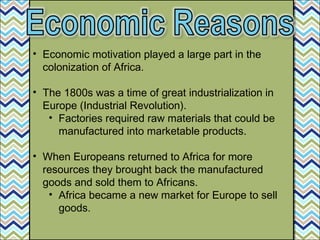
European partitioning across africa2b
- 1. • Economic motivation played a large part in the colonization of Africa. • The 1800s was a time of great industrialization in Europe (Industrial Revolution). • Factories required raw materials that could be manufactured into marketable products. • When Europeans returned to Africa for more resources they brought back the manufactured goods and sold them to Africans. • Africa became a new market for Europe to sell goods.
- 2. • Politics in Europe also led to the colonization of Africa. • Nationalism, a strong sense of pride in one's nation, resulted in competition between European nations. • No major nation wanted to be without colonies, which led to this “Scramble for Africa”. • The competition was particularly fierce between Great Britain, France, and Germany, the strongest European nations in the 1800s.
- 4. • Christian missionary work gained strength during the 1800s as European countries were becoming more involved in Africa. • Many missionaries were supportive of the colonization of Africa because they believed that European control would provide a political environment that would help missionary activity. • The idea of “Christianizing” Africa also made many Europeans look favorably on the colonization of the continent.
- 5. • By the 1880s, Great Britain, France, Germany, Belgium, Spain, and Portugal all wanted part of Africa. • To prevent a European war over Africa, leaders from fourteen European governments and from the United States met in Berlin, Germany, in 1884. • No Africans attended the meeting. • At the meeting, the European leaders discussed Africa’s land and how it should be divided.
- 7. • Going into the meeting, roughly 10% of Africa was under European colonial rule. • By the end of the meeting, European powers “owned” most of Africa and drew boundary lines that remained until 1914. • Great Britain won the most land in Africa and was “given” Nigeria, Egypt, Sudan, Kenya, and South Africa after defeating the Dutch Settlers and Zulu Nation. • The agreements made in Berlin still affect the boundaries of African countries today.
- 8. Political Boundaries after Berlin Conference
- 9. Talk with your group about what you think is going on in this political cartoon. Be ready to share you answer with the class.
- 10. • European powers organized Africa’s population in ways to make the most efficient workforce, ignoring the natives’ cultural groups or existing political leadership at the time of colonization. • Sometimes they grouped together people who had never been united under the same government before. • Sometimes they divided existing groups of people. • The creation of these borders had a negative impact on Africa’s political and social structures by either dividing groups that wanted to be together or combining ethnic groups that were enemies.
- 11. • Europeans placed colonies into administrative districts and forced the Africans to go along with their demands. • In order to establish their indirect rule, Europeans used local chiefs as their enforcers in the colonies. • Europeans also tried to assimilate Africans (have African people give up their own African customs and adopt European customs). • Protests and revolts were common and starvation and disease became widespread.
- 12. Talk with your group about what you think is going on in this political cartoon. Be ready to share you answer with the class.
- 13. • Europeans took the best land by force. • African farmers were forced to grow cash crops like cocoa and coffee, causing there to be a shortage of food in many areas of Africa. • Africans were forced to work under terrible conditions on plantations, railways, and logging. • In order to gain power, Europeans encouraged Africans to fight against each other. • New political boundaries caused ethnic groups to clash. • This has led to ethnic and political unrest in Africa today. • There have been over 50 ethnic conflicts in Africa since WWII as a result of the colonial lines drawn by Europeans.
- 14. Talk with your group about what you think is going on in this political cartoon. Be ready to share you answer with the class.
- 15. • By the mid-twentieth century, Africans began to openly oppose European control of their countries. • It was obvious that colonialism was not fair, as it only benefitted the Europeans. • Africans were tired of being treated like second- class citizens on their own land. • They soon begin to demand freedom for themselves…
